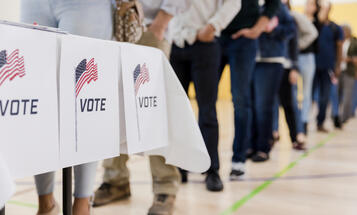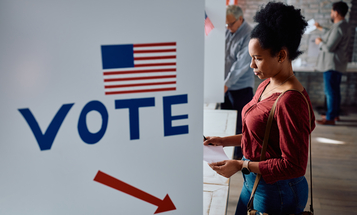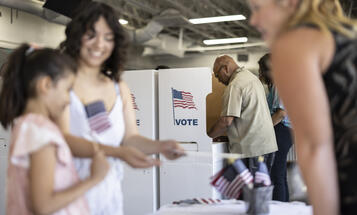
How and Why the DOJ Is Enforcing the National Voter Registration Act in Connecticut
Connecticut’s legally-required Motor Voter program is one of the country's worst performing.
As a born-and-raised Connecticuter, I was disappointed to see the state’s Motor Voter program was ranked among the lowest-performing in Demos’s 2015 report Driving the Vote. In fact, Connecticut was the third worst-performing state, edged out only slightly by Mississippi and Alabama. That’s all likely to change, however, due to a recent enforcement action brought against state officials by the U.S. Department of Justice.
Last Friday, that action culminated in a Memorandum of Understanding — a binding agreement enforceable in federal court — requiring Connecticut to implement procedures and practices that will bring it into compliance with the National Voter Registration Act (NVRA), the federal law more affectionately known as “Motor Voter,” which was passed in 1993 to increase voter participation by making every driver’s license application also serve to register the applicant to vote. The centerpiece of the MOU is the creation of an electronic voter registration system that combines the driver’s license and voter registration applications. The customer’s information, provided as part of the DMV application, will automatically be used to register the customer to vote unless she indicates she does not want to register.
In addition, all change of address forms used by the DMV will be revised so that any change of address — whether in the same town or to a new town — will be applied to the customer’s voter registration record, unless she opts out. Change of address forms will also allow an unregistered customer to register to vote for the first time. The agreement, which covers DMV branch offices and private contractors such as AAA, also requires a wide array of mechanisms to monitor compliance including data tracking and analysis, training, and designation of NVRA Coordinators at the state level and at each DMV office. All of these procedures and practices were recommended in Driving the Vote and many are in place in the states that the report found to have the most effective Motor Voter systems — Delaware and Michigan.
This agreement with Connecticut comes on the heels of the Department’s MOU with Alabama and an agreement entered into by Demos and others with officials in California, two other states Demos identified as among the poorest Motor Voter performers. Demos is also involved with ongoing litigation against officials in North Carolina to bring that state into compliance with the law.
Providing effective and compliant voter registration services at motor vehicle departments can dramatically increase the number of registered voters. As the election approaches and citizens become more interested in the candidates, hopefully other states will voluntarily improve their motor voter programs without the threat of litigation.



